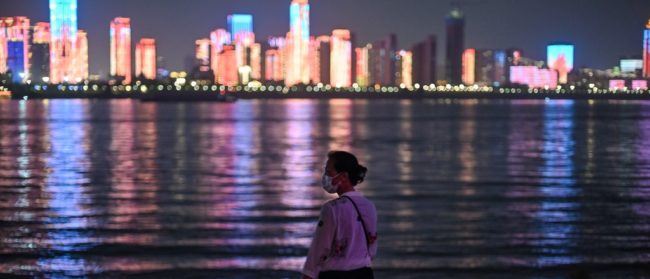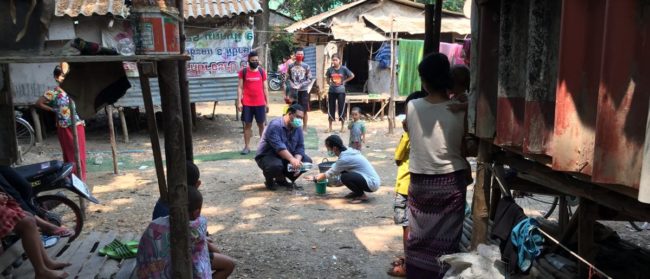The usually bustling lobby of the Taipei Main Station has been hushed by Covid-19 shutdowns, but a group broke the silence last weekend to demonstrate for minority rights.
Around 300 people gathered on 23 May in the station’s lobby to protest a potentially permanent ban on sitting or congregating in the main hall, a move put forth by the Taiwan Railways Administration (TRA) on 18 May. While most commuters are only passing through, many migrant workers in the city have come to rely on the public space as an unofficial Sunday meeting hall.
Now, some of these workers and their Taiwanese advocates see the ban as implicitly targeting Taipei’s migrants, who usually gather in their hundreds on the floor of the station’s grand main hall.
Last weekend, several individuals, among them human rights activists, initiated a sit-in protest to support the rights of the migrant workers to gather, a move demonstrators said was part of fair access to public space. The Saturday protest marked one of the few sizable demonstrations since the beginning of the coronavirus outbreak in Taiwan.
“Regardless of migrants, Taiwanese, foreigners, this space represents the diversity of our society,” said Taipei resident Sandra Hsu, who brought her kids to participate in the demonstration. Another parent played board games with his son on the floor, leaving a cardboard beside him, with the words “we should treat everyone gently”.


Migrant workers celebrating Eid at Taipei Main Station on May 24. Photo: Ying-Yu Alicia Chen
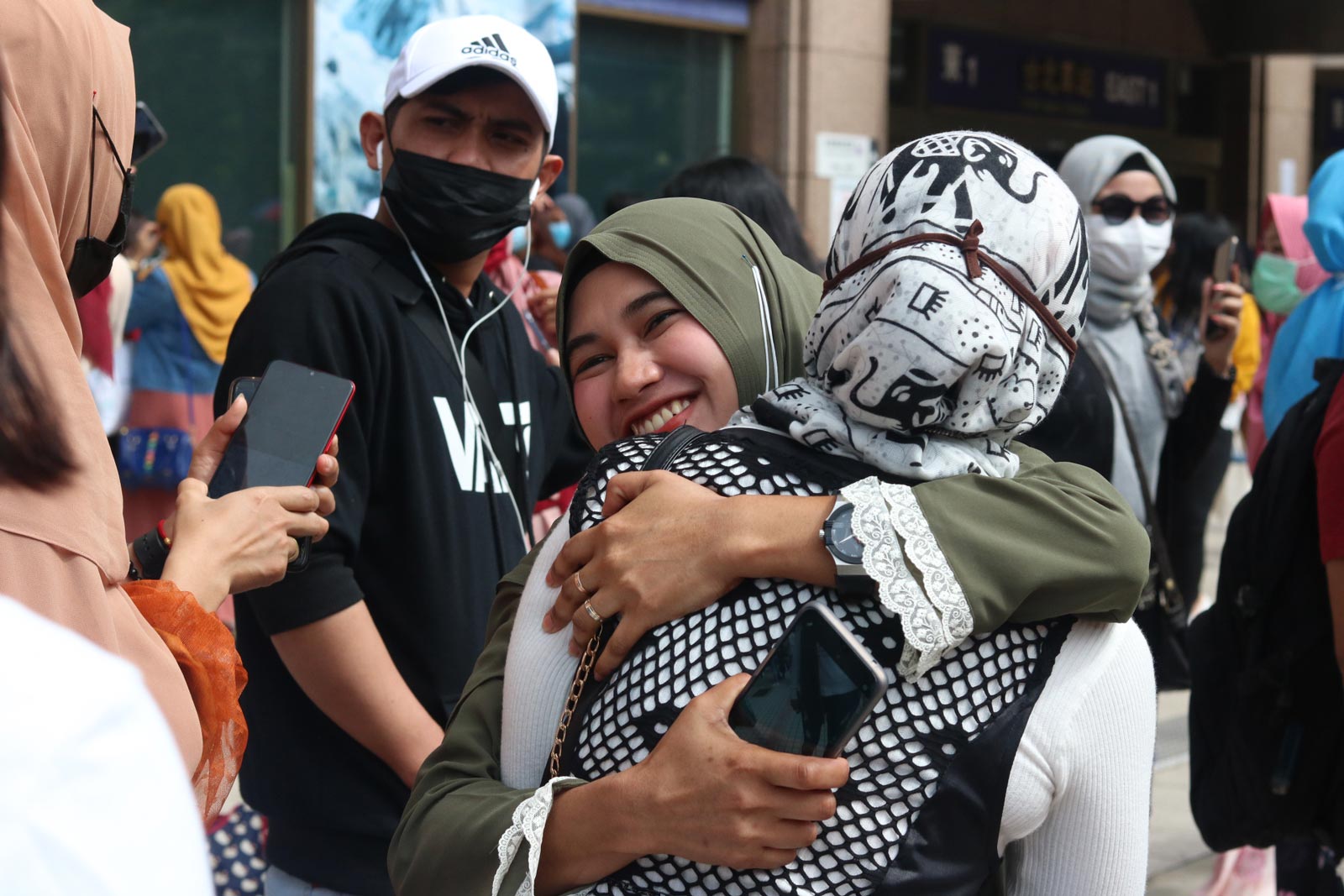
A space which is open to everyone is the most friendly social safety net for the vulnerable
Ting Shuo Hu, a disabled participant in the protest who is dedicated to social innovation work, said the station lobby is not only an essential social space for migrant workers, but that it also represents Taipei’s history.
Many demonstrations and historical events had taken place in the hall of Taipei Main Station in the past 30 years as Taiwan has democratised, and in 2012 there was another sit-in protest in the hall regarding similar concerns of a ban on congregating in the hall.
“A space which is open to everyone is the most friendly social safety net for the vulnerable,” Hu added, referring to a slogan of non-profit social organisation Do You A Flavour, who were present at the event.
TRA has prohibited visitors from sitting in the lobby of the central transportation hub since late February after the first undocumented migrant worker from Indonesia tested positive for Covid-19. While Taiwan has lifted indoor and outdoor social gatherings measures due to no confirmed local cases for more than 40 days, TRA recently pushed to indefinitely extend the ban in the station. The move was announced just a week prior to Eid al-Fitr, which immediately sparked polarised debate on social media.
Since 2012, the station and its immediate vicinity has become a gathering place for tens of thousands of Muslims, mainly from Indonesia, to celebrate the Muslim holiday of Eid al-Fitr ending the holy month of Ramadan.
Taiwan is home to approximately 710,000 migrant workers, mostly from Indonesia and Vietnam, making up about 38% and 31% respectively of the total population. Many more are also from the Philippines and Thailand.
Some Taiwanese netizens argued that TRA was using Covid-19 as an excuse to limit mostly migrant workers from congregating in the main hall on their days off. However, the recent controversy around the TRA restrictions has also hit on a recurring narrative about Taiwan’s hostility towards migrant workers, with many agreeing with the ban on sitting in the main hall, saying it harms the city’s image and public order.
Before Covid-19, the main hall of Taipei Main Station was considered a multicultural space in Taipei, with Mayor Ko Wen-ji even lauding it as a symbol of Taipei’s inclusivity and diversity. Last year, the mayor attended a prayer service at the largely Indonesian Eid gathering, where he delivered traditional holiday greetings and pledged to make the city more Muslim-friendly to welcome visitors from abroad.
The One-Forty Foundation, a civil society group that advocates for migrant workers, has since 2015 organised activities during Eid for migrant workers in the station’s main hall. This year, the group declined to do so, citing Covid-19 restrictions. Instead, they invited Taiwanese citizens to give Indonesian migrant workers a balloon and a Chinese-language learning package as an Eid gift, a move intended to show solidarity.
Most migrant workers are employed in the care sector or industrial jobs, like factories and construction, and typically get very few days off while earning relatively low salaries. In that context, Taipei Main Station’s public hall has become a convenient and, most importantly, free social venue in which they can gather.
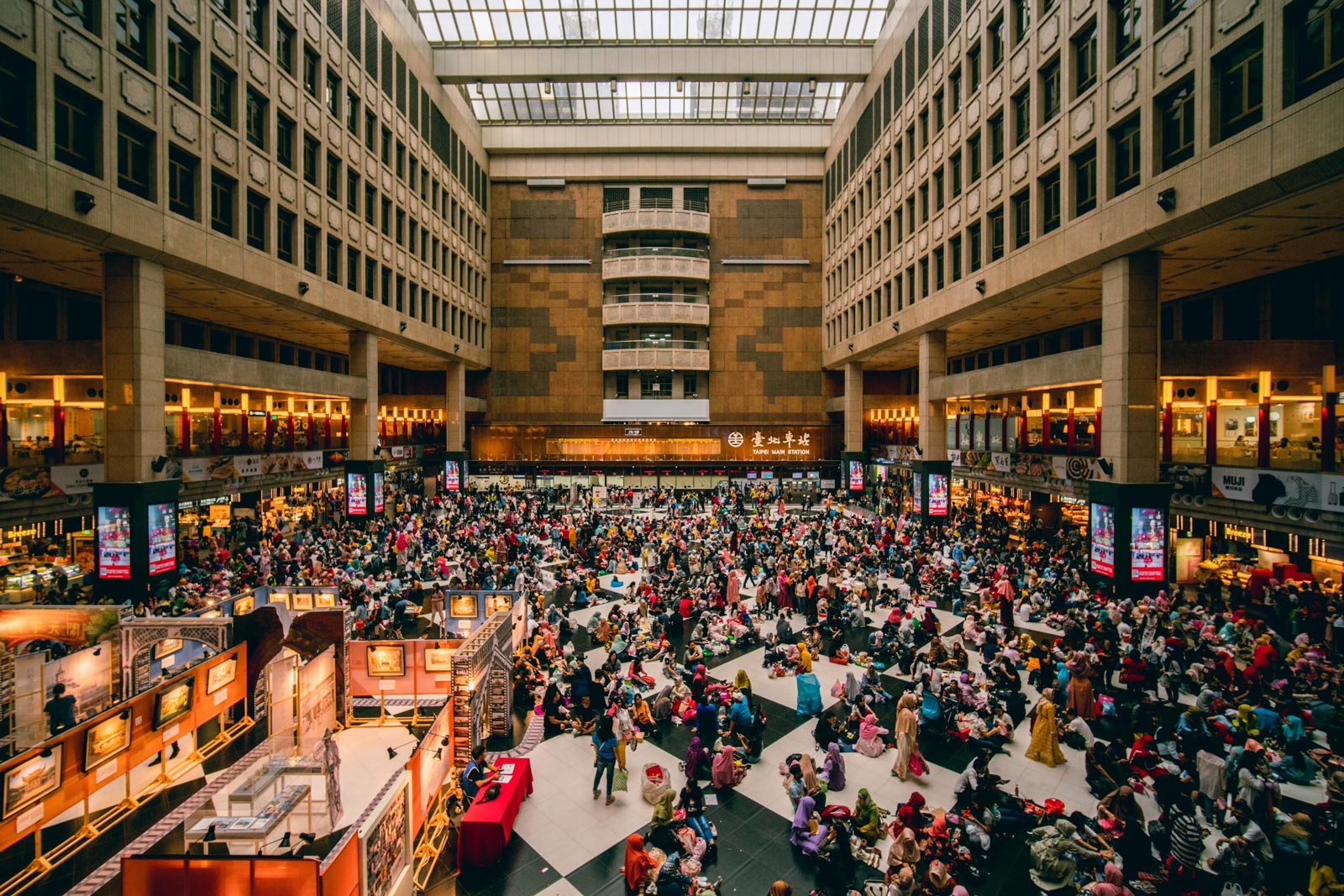
In Saturday’s lobby demonstration, protestors took the space with activities like dancing or sitting on the floor to paint and read storybooks to children. A few also presented political banners or played songs in support of Hong Kong pro-democracy demonstrators following the announcement on May 22 that China would enact a controversial national security law.
However, a notable absence from the demonstrations were migrant workers themselves, with almost none present. Only around twenty migrant advocates sat in the station lobby floor holding protest banners on Sunday, allied with Taiwan International Workers’ Association (TIWA) and other advocate groups.
But at least one of them told local media that migrant voices were excluded from the statements made by TRA about preventing people from gathering in the hall indefinitely.
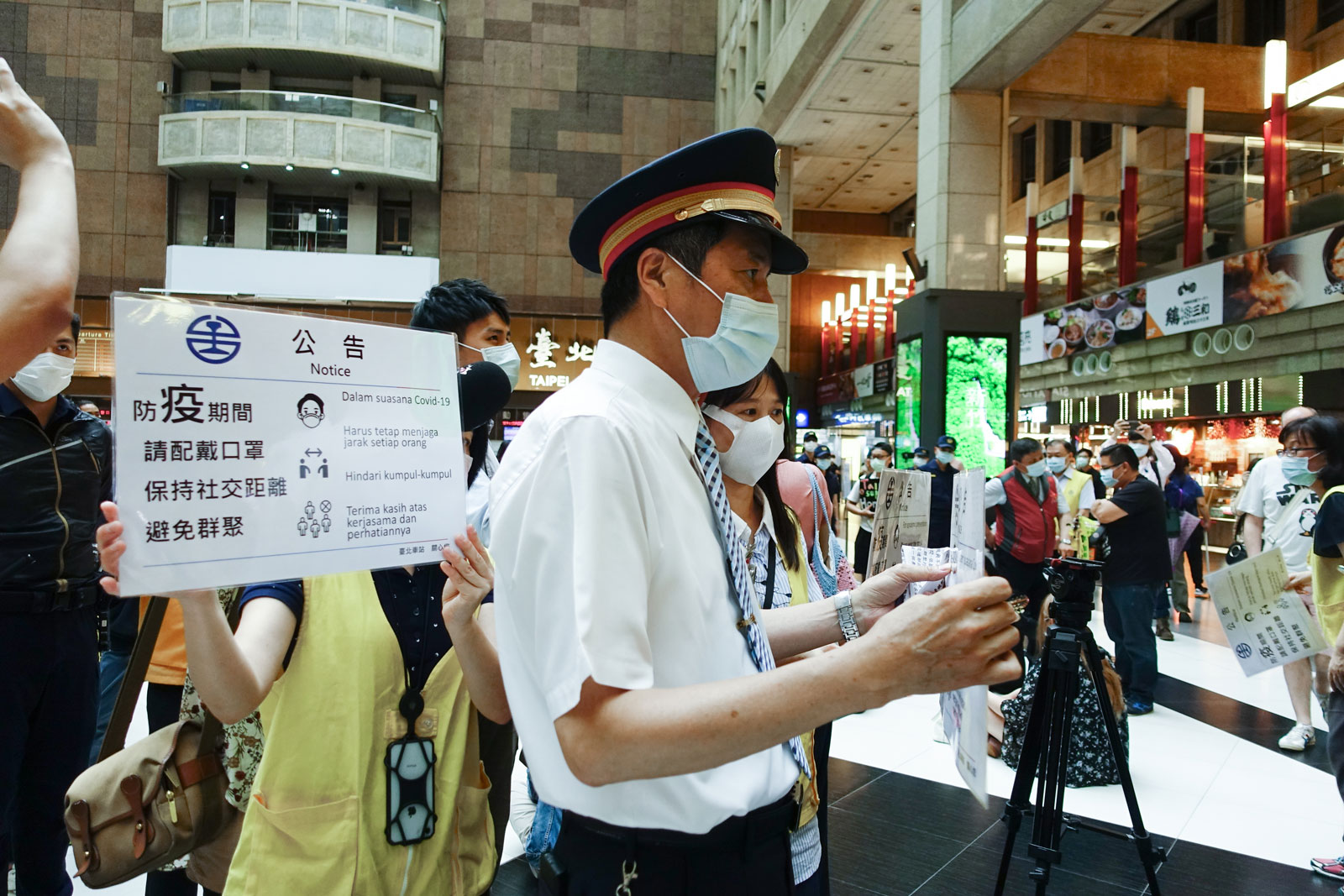
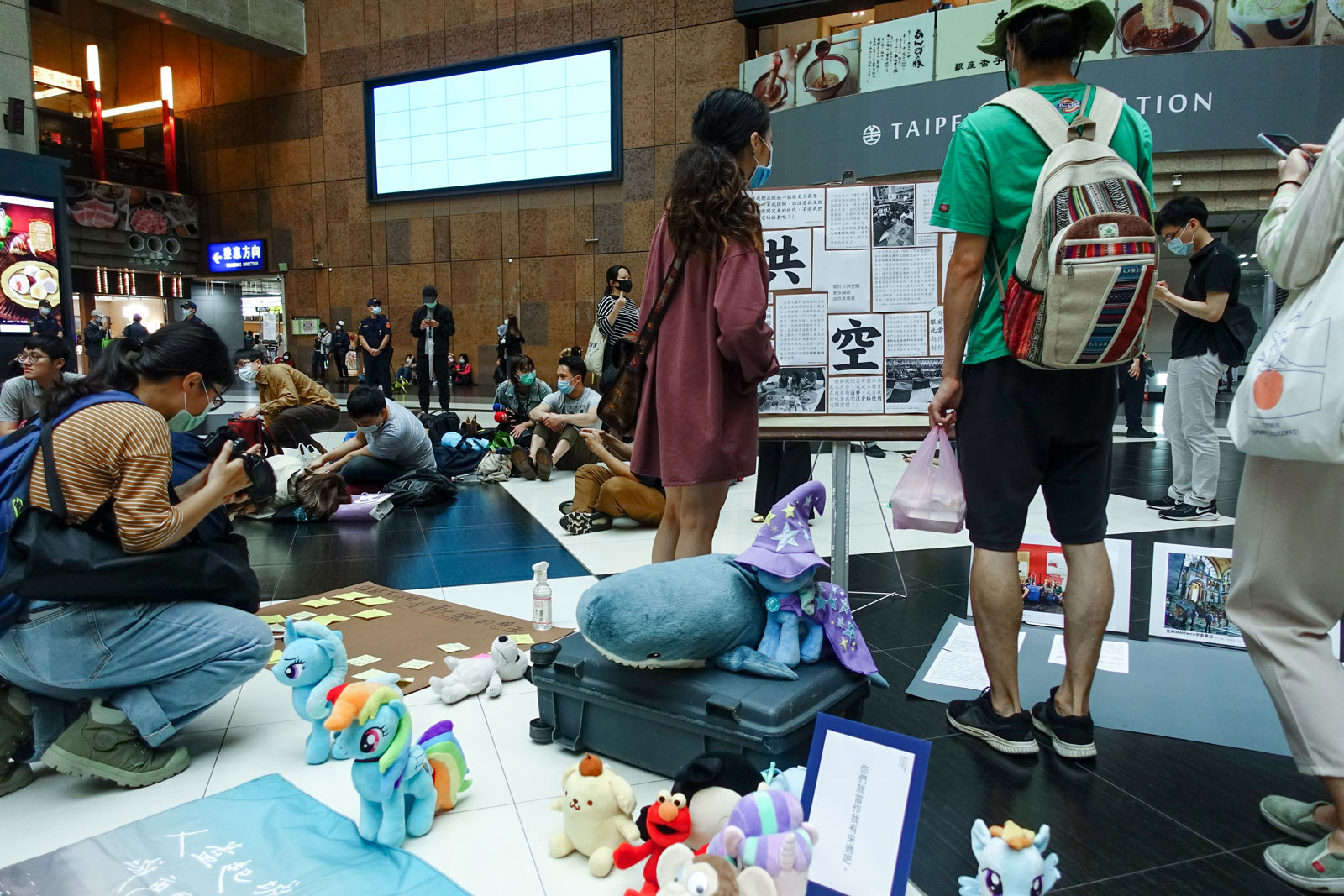
Protestors play games and chant in the station on May 23. Photo: Ying-Yu Alicia Chen
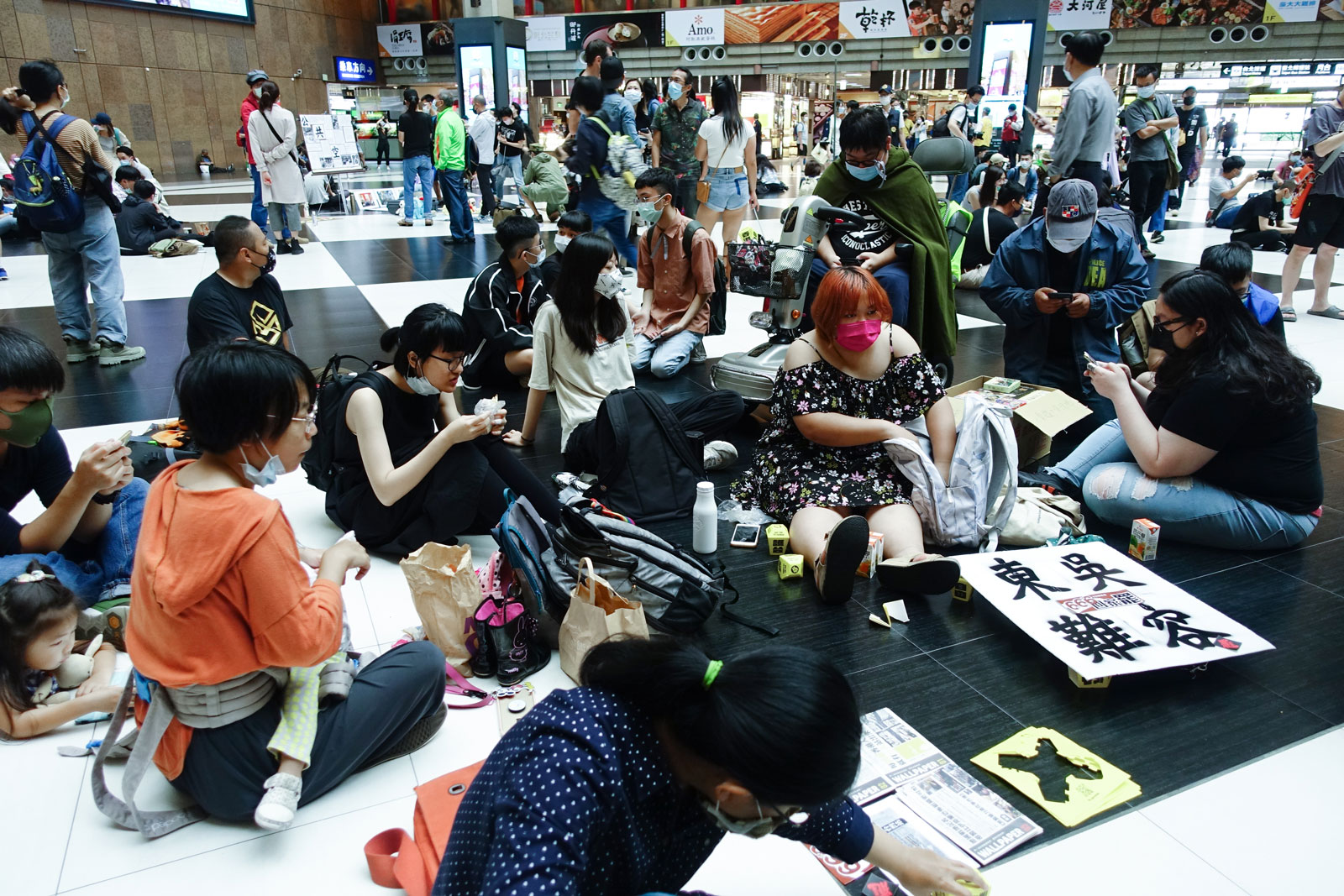
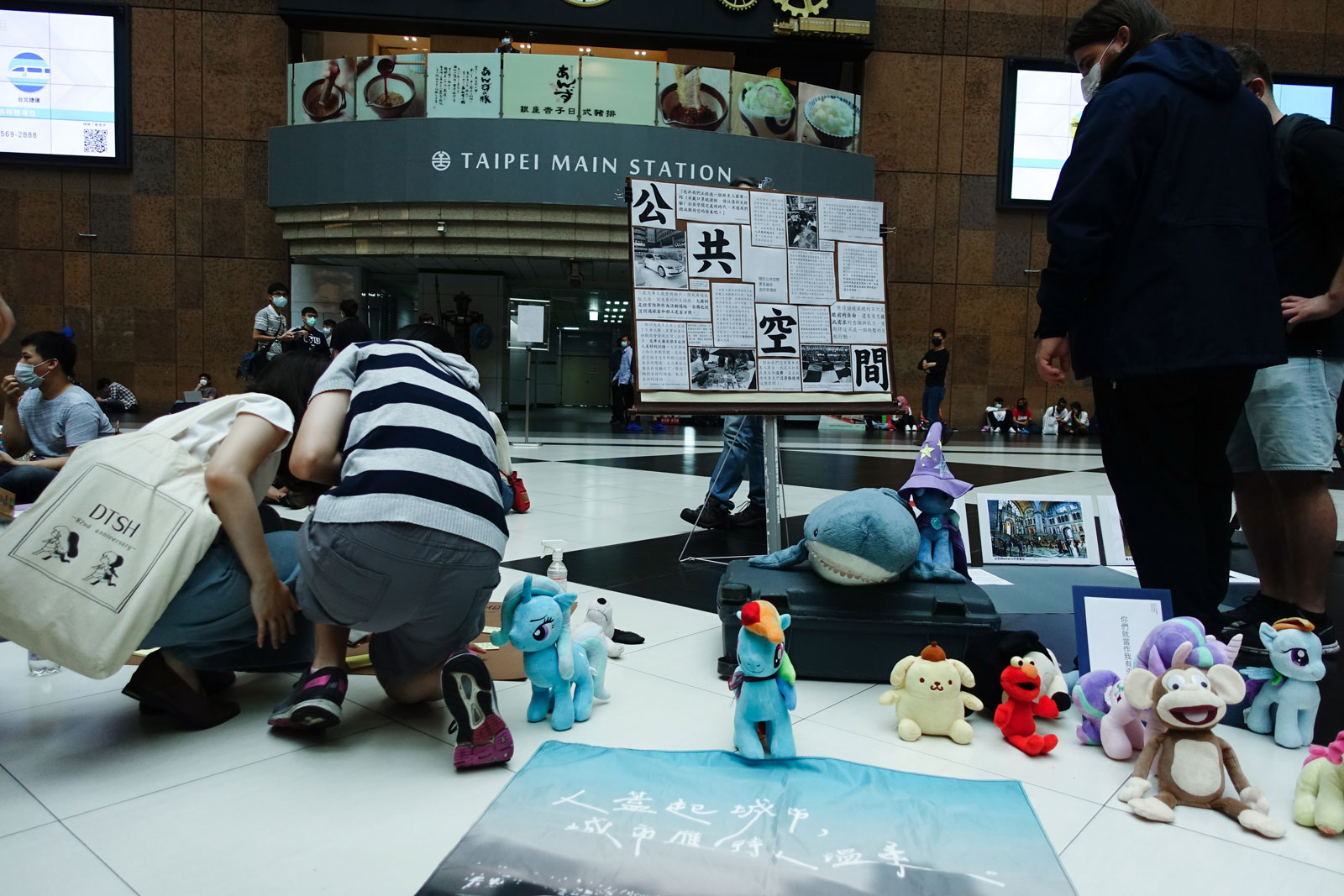
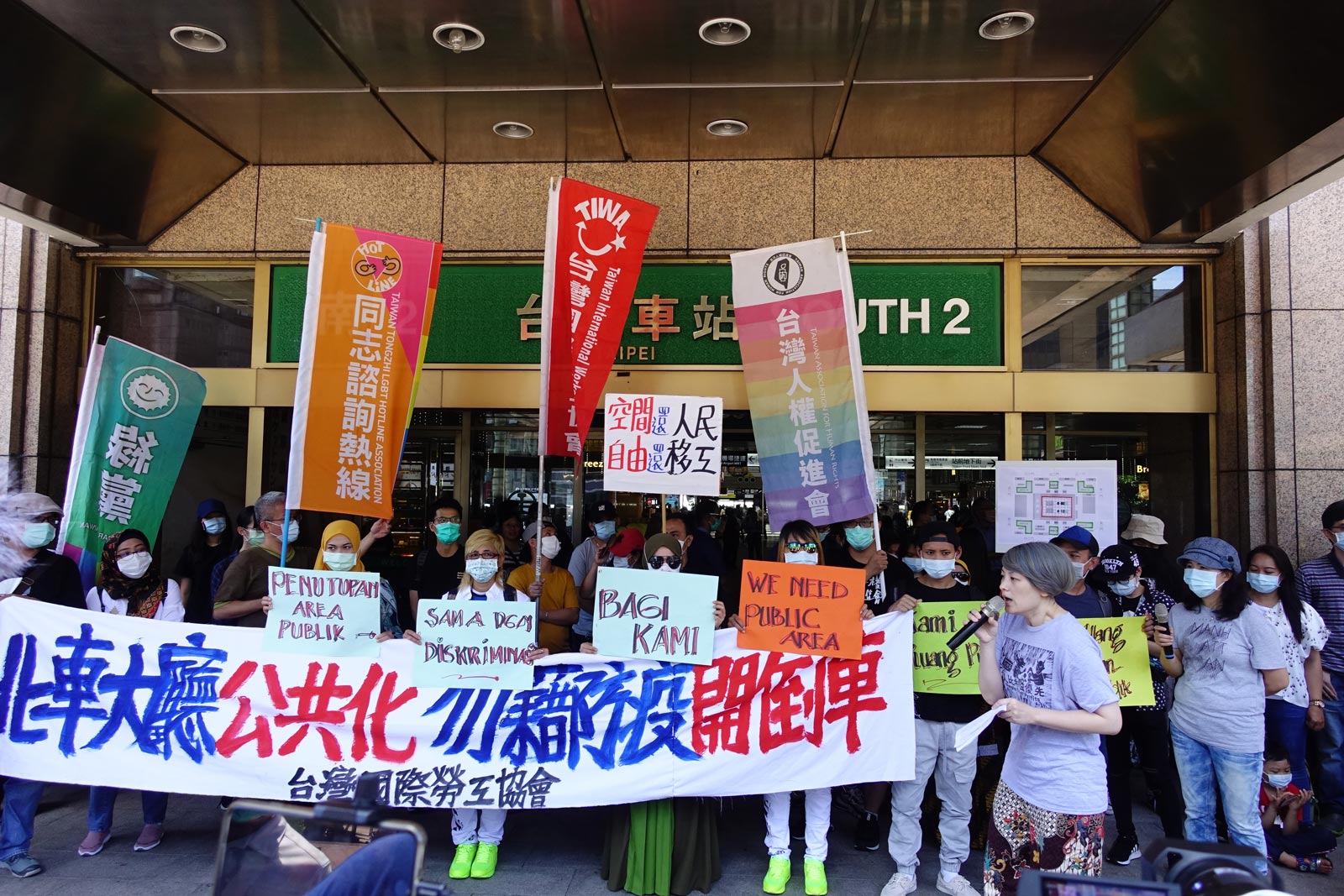
I think there is a lot of apprehension among migrant communities about participating in this protest because legal protection for a lot of migrants from Southeast Asia in Taiwan is not very comprehensive
Another, Nia, a 30-year-old Indonesian migrant worker sitting on the floor outside the station, was unaware of the protest occurring inside, telling the Globe it was her first time there since the February ban went into place.
“I often came to this hall to meet up with my friends as it’s very convenient. It would be a pity if [congregation in the hall] is banned permanently,” Nia said.
While showing appreciation for demonstrators’ support, she emphasised her being at the station was not part of the protest. Her caution about being associated with it is perhaps reflective of low-wage migrants’ sense of vulnerability in Taiwan.
“I think there is a lot of apprehension among migrant communities about participating in this protest because legal protection for a lot of migrants from Southeast Asia in Taiwan is not very comprehensive,” said Marcin Jerzewski, a European researcher and protest attendee who studies welfare politics in Indonesia. He admitted some of his Indonesian friends feared joining the demonstration.
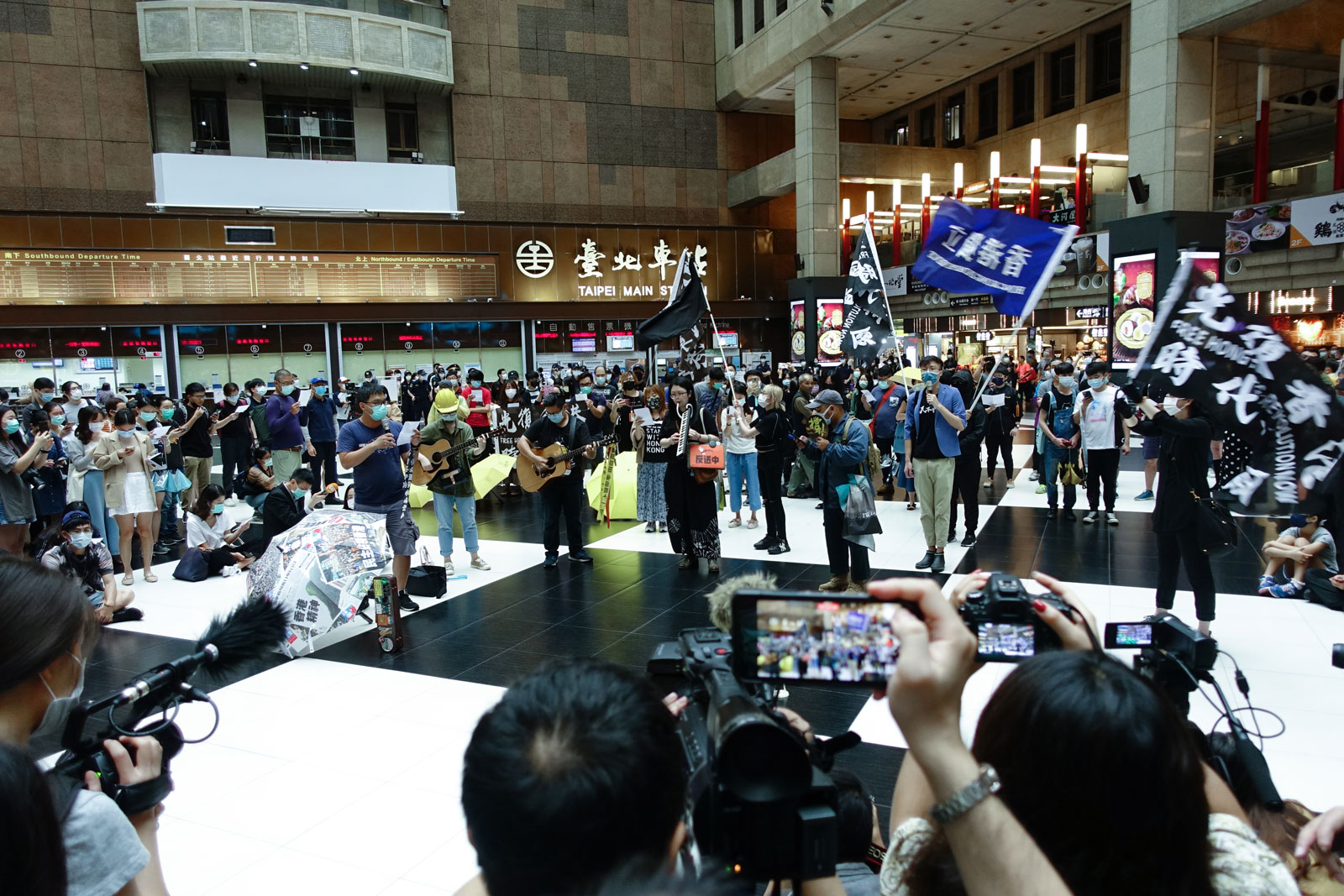
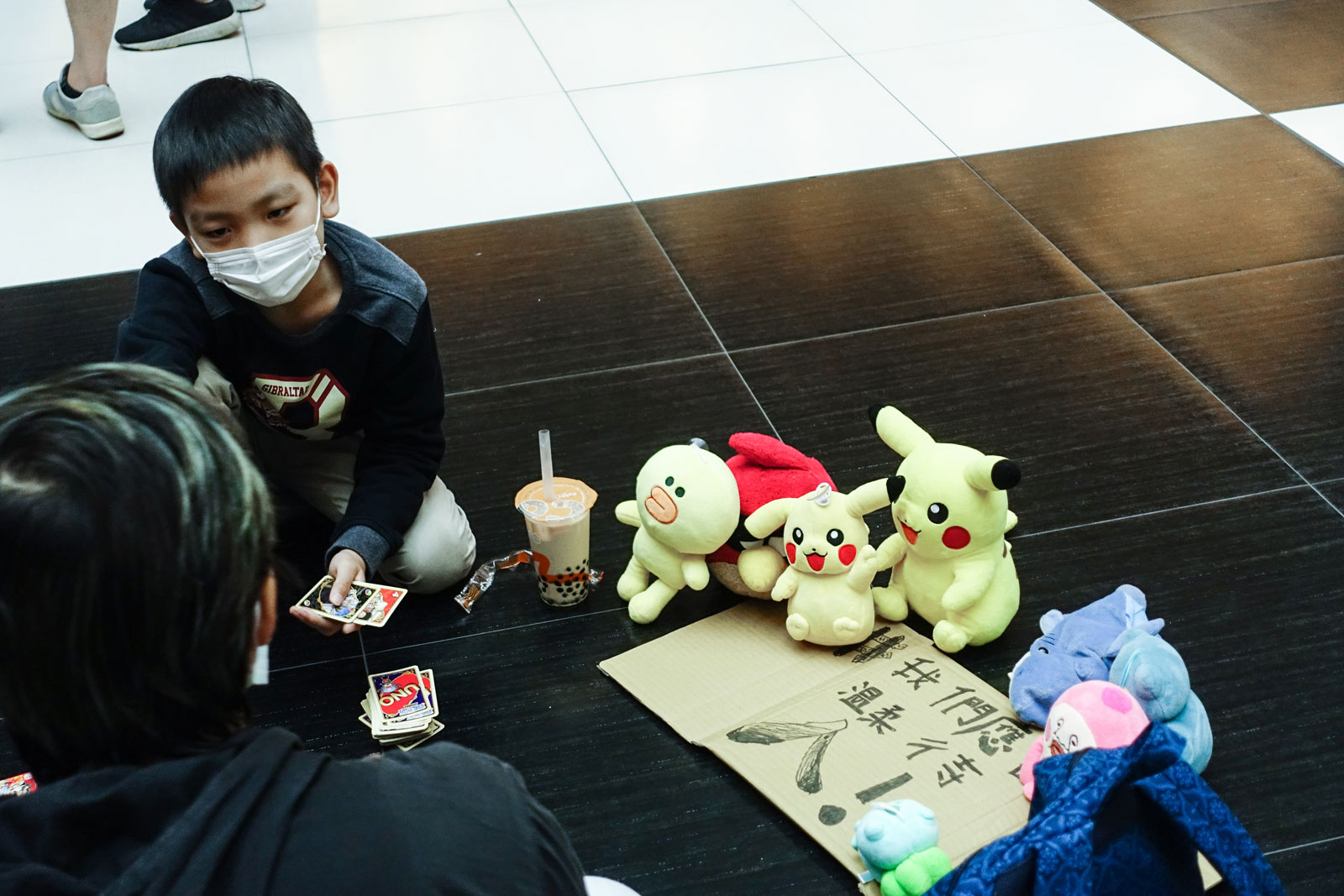
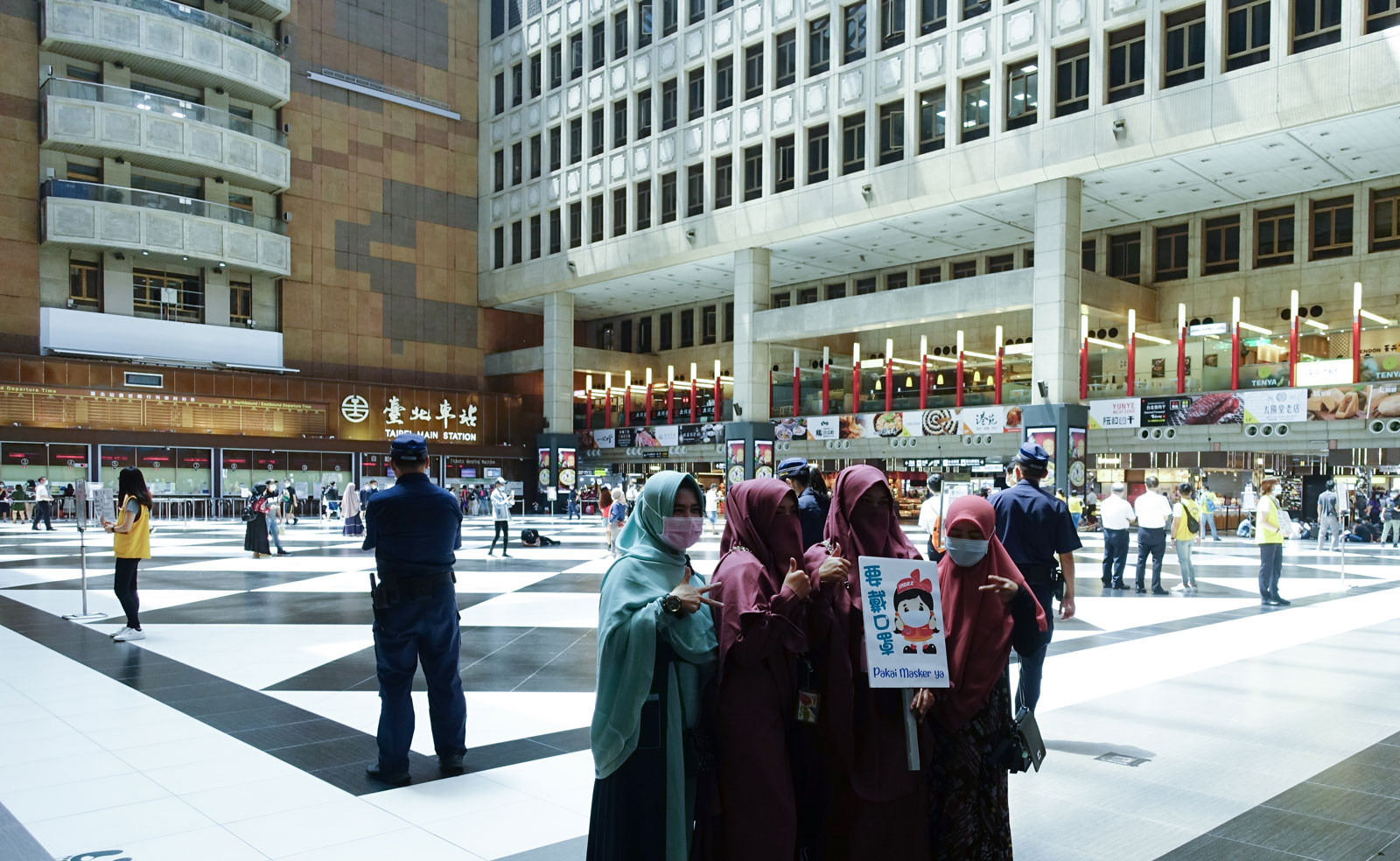
While Taiwan is one of the few Asian countries that grants documented migrant workers with freedom of assembly, there remains fear among migrant workers about their rights.
On Sunday, more than a thousand Muslims wearing masks, including many Indonesian migrant workers, continued the tradition to celebrate Eid in and around Taipei Main Station, but were careful not to go into the station lobby to sit on the floor. The celebrating Muslims embraced in large groups, but were shadowed by police and TRA staff.
In response to the public backlash, both the Ministry of Transportation and Communications and TRA have since released statements on 19 May and 23 May indicating that they will consult public opinions and gradually reopen the Taipei Main Station hall with moderate management.
Yet it remains uncertain whether the government will keep the main hall inclusive, as it was prior to the coronavirus outbreak, or whether this is the beginning of higher hidden barriers for vulnerable populations to get access to the public space.
While the protests have placed pressure on the government to respond, the furor surrounding the station’s accessibility has prompted concerns again that the voices of migrant workers in Taiwan are still often left out from public decisions that impact them.

